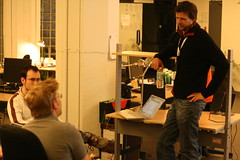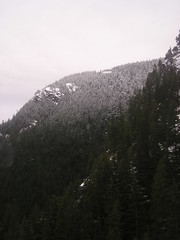Before the new year, the death of former United States President Gerald Ford took the sails out of former-Senator John Edwards' announcement that the latter would run for the highest office in the land. Press platitudes described Ford—the only in American history to be neither elected as Vice President nor as President—appointed by Nixon after Spiro Agnew resigned, ascending to the Presidency after Nixon resigned—as "decent" and "honorable", an image that despite press clichés, still has resonance. Ford appeared at the end of an episode of The Simpsons, asking Homer if he liked football and nachos, and whether the latter wanted to join him in watching the football game while eating nachos. Homer, the episode makes clear, identified with the former President, because both were a little dim and a little clumsy, but at the core, decent human beings unlike the episode's portrayal of a hateful George H.W. Bush.
John Robert Greene's book, The Presidency of Gerald R. Ford attempts to portray the President as a man leading an administration in search of an agenda, only to have it derailed by both his miscalculations and Congress' increased power after a nation appalled at the executive branch's excess. We are given a tour of Ford's domestic and foreign policies, as well as political intrigue involving Ronald Reagan's challenge to the incumbent's re-nomination (nominations of a sitting President these days being a done deal), as well as former Nixon administration officials who either disliked Ford personally or were bitter about their exit from the halls of power.
The Nixon pardon was—and remains—Ford's most controversial act as President. Anticipating neither the outcry nor its vociferousness, the pardon shattered Ford's image of humble, honest President who appealed for healing after Watergate. Ford was an angry, partisan, political president that sometimes acted on principle (school busing and desegregation) and out of political concerns (New York City's bailout). Greene does not judge Ford as harshly as Christopher Hitchens about the Mayaguez rescue mission, one of the few foreign policy crises Ford faced. Greene recounts the punitive air strikes matter-of-factly, almost as if Ford didn't care that the crew had been released already. (While both discuss the Solzhenitisyn snub, Hitchens covers Ford's turnaround against the Kurds in Iraq, while Greene does not cover it at all.) Greene devotes full chapters to Ronald Reagan's challenge to Ford for the 1976 Republican presidential nomination—Ford ultimately eked out a victory both in the primaries and at the convention—and another chapter to the presidential campaign against Jimmy Carter, to whom Ford lost.
Greene's book, while short at 193 pages (this excludes the endnotes, bibliographic essay and index), comes very detailed, outlining Ford's rise from Congress to the vice presidency to the presidency. The book also features tidbits on major contemporary political players, like the aforementioned Reagan but also Richard Cheney (currently George W. Bush's Vice President) and Donald Rumsfeld (up until recently Bush's Defense Secretary). Greene has written another book about a one-term president, George. H.W. Bush, and that book is next on my reading list about U.S. Presidents. One-termers have necessarily less written about them than two-timers. While they seem a little more mysterious because of that, they still have enough primary resources to draw upon for book-length studies. The George H.W. Bush book no doubts talks about players in that Presidency that will make up a future Republican presidential administration.
Ford's brief experience offers lessons for future presidents—and decision-makers in general who are thrust to the top of an organization with not a lot of preparation, and that is what makes Greene's study of Gerald Ford so interesting. The writing is accessible, not bogged down in interpretation or policy details, but written as a story about a football-playing midwestern President with a public image of sometimes having a few sandwiches short of a picnic, whom the American people judged still too close to Nixon and the perceived moral failings of the Republican Party in the 1970s. A President, in Greene's mind, who nevertheless set out to heal the nation and succeeded.


